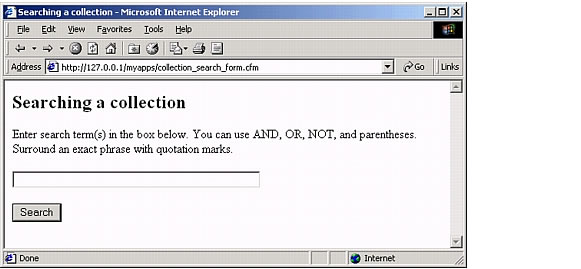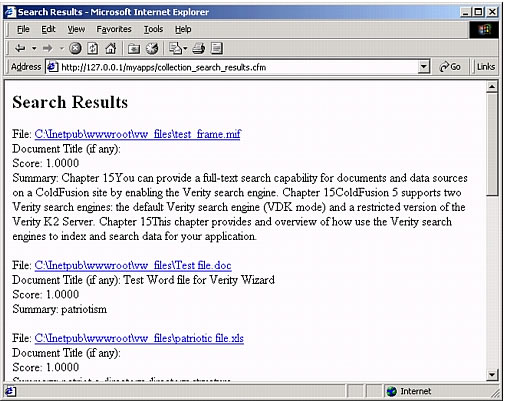Using the cfsearch tag
You use the cfsearch tag to search an indexed collection. Searching a Verity collection is similar to a standard ColdFusion query: both use a dedicated ColdFusion tag that requires a name attribute for their searches. The following table compares the two tags:
| cfquery
|
cfsearch
|
Searches a data source
|
Searches a collection
|
Requires name attribute
|
Requires name attribute
|
Uses SQL statements to specify search criteria
|
Uses a criteria attribute to specify search criteria
|
Returns variables keyed to database table field names
|
Returns a unique set of variables
|
Uses cfoutput to display query results
|
Uses cfoutput to display search results
|
Note: You receive an error if you attempt to search a collection that has not been indexed.
The following are important attributes for the cfsearch tag:
- name The name of the search query.
- collection The name of the collection(s) being searched. Use a fully qualified path for an external collection. Separate multiple collections with a comma; for example,
collection = "sprocket_docs,CodeColl".
- criteria The search target (can be dynamic).
Each cfsearch returns variables that provide the following information about the search:
- RecordCount The total number of records returned by the search.
- CurrentRow The current row of the record set being processed by
cfoutput.
- RecordsSearched The total number of records in the index that were searched. If no records were returned in the search, this property returns a null value.
Note: To use cfsearch to search a Verity K2 Server collection, the collection attribute must be the collection's unique alias name as defined in the k2server.ini and the external attribute must be "No" (the default). For more detail, see Configuring and Administering ColdFusion MX.
You can use search form and results pages similar to the following examples to search a collection.
To create a search form:
- Create a ColdFusion page with the following content:
<html>
<head>
<title>Searching a collection</title>
</head>
<body>
<h2>Searching a collection</h2>
<form method="post" action="collection_search_action.cfm">
<p>Enter search term(s) in the box below. You can use AND, OR, NOT, and
parentheses. Surround an exact phrase with quotation marks.</p>
<p><input type="text" name="criteria" size="50" maxLength="50">
</p>
<input type="submit" value="Search">
</form>
</body>
</html>
- Save the file as collection_search_form.cfm.
Enter a search target word(s) in this form, which passes this as the variable criteria to the action page, which displays the search results.
To create the results page:
- Create a ColdFusion page with the following content:
<html>
<head>
<title>Search Results</title>
</head>
<body>
<cfsearch
name = "codecoll_results"
collection = "CodeColl"
criteria = "#Form.Criteria#">
<h2>Search Results</h2>
<cfoutput>
Your search returned #codecoll_results.RecordCount# file(s).
</cfoutput>
<cfoutput query="codecoll_results">
<p>
File: <a href="#URL#">#Key#</a><br>
Document Title (if any): #Title#<br>
Score: #Score#<br>
Summary: #Summary#</p>
</cfoutput>
</body>
</html>
- Save the file as collection_search_action.cfm.
- View collection_search_form.cfm in the web browser:

- Enter a target word(s) and click Search.
The following figure shows how the output appears:

Note: As part of the indexing process, Verity automatically produces a summary of every document file or every query record set that gets indexed. The default summary selects the best sentences, based on internal rules, up to a maximum of 500 characters. Every cfsearch operation returns summary information by default. For more information on this topic, see Using Verity Search Expressions.

